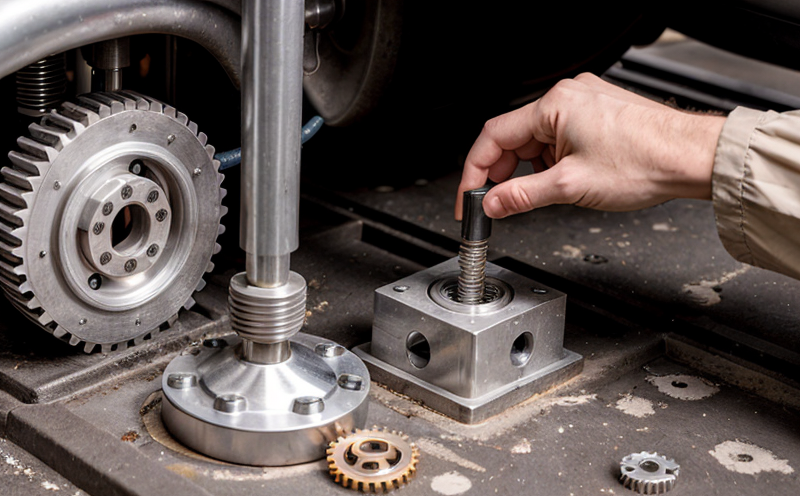ASTM E83 Verification of Extensometer Systems
The ASTM E83 standard specifies the procedures for verifying extensometers used in tensile testing. This service is essential for ensuring that instruments are accurate, reliable, and compliant with international standards—essential for industries reliant on precise mechanical property data.
Extensometer systems play a crucial role in the quality control of materials during manufacturing processes such as additive manufacturing (AM) and 3D printing. The verification process ensures these devices can provide consistent, repeatable measurements that are critical to product development and compliance with regulatory standards.
The ASTM E83 verification involves several key steps: selecting appropriate test specimens, calibrating the extensometer, performing tensile tests under controlled conditions, and analyzing results against predefined acceptance criteria. This process ensures that every measurement made by the device adheres to industry best practices and standards.
During the testing phase, specimens are typically prepared from the same material as those used in production processes, ensuring accurate representation of real-world conditions. Specimens may include wires, rods, or other shapes appropriate for tensile testing. Calibration procedures ensure that any deviations between expected and actual readings can be identified and corrected.
The primary outcome of this service is a comprehensive report detailing the performance of the extensometer system under various loading conditions. Reports typically include detailed descriptions of test procedures followed, observed behaviors during tests, and final acceptance or rejection decisions based on compliance with ASTM E83 standards.
Compliance with ASTM E83 not only enhances confidence in measurement accuracy but also supports regulatory requirements across multiple sectors including aerospace, automotive, electronics manufacturing, and construction. By adhering to these stringent verification protocols, companies can maintain high levels of quality assurance throughout their supply chains.
In summary, the ASTM E83 Verification of Extensometer Systems ensures precision in tensile testing essential for maintaining consistent material performance across additive manufacturing processes. This service is indispensable for industries where accurate mechanical property data translates directly into product quality.
- Selection of appropriate test specimens to reflect real-world conditions.
- Calibration procedures ensuring device accuracy.
- Tensile tests conducted under controlled environmental parameters.
- Compliance checks against ASTM E83 acceptance criteria.
Scope and Methodology
The scope of the ASTM E83 verification extends beyond simple calibration; it encompasses a thorough evaluation of extensometer performance across multiple loading scenarios. This comprehensive approach ensures that any potential issues are identified early, allowing for prompt correction before they impact subsequent tests or final products.
During the verification process, several factors contribute to ensuring accurate results:
- Type of Specimen: Specimens must be representative of those used in actual manufacturing processes. For additive manufacturing and 3D printing applications, this could involve selecting wires, rods, or complex geometries depending on the specific application.
- Loading Conditions: Tests are conducted under controlled environmental conditions to simulate typical operating environments where the material will be used. This includes temperature control, humidity levels, and other relevant parameters.
- Data Acquisition: Continuous monitoring of strain measurements throughout each test allows for real-time analysis and correction of any discrepancies early in the process.
The methodology involves meticulous preparation of specimens before testing begins, followed by rigorous execution of tensile tests according to specified procedures. Post-test evaluation includes detailed examination of all recorded data against predefined acceptance criteria laid out in ASTM E83.
By adhering strictly to these guidelines, we ensure that every aspect of the extensometer's performance is thoroughly examined, providing peace of mind regarding its reliability and accuracy.
Eurolab Advantages
At Eurolab, our commitment to excellence in additive manufacturing & 3D printing testing sets us apart from other laboratories. Our team of highly skilled professionals combines extensive experience with cutting-edge technology to deliver accurate and reliable results.
We leverage state-of-the-art equipment calibrated according to international standards, ensuring consistent accuracy across all tests. This allows us to provide precise measurements that meet the highest industry expectations. Our laboratories are equipped with advanced software solutions designed specifically for tensile testing, allowing for efficient data analysis and reporting.
Our expertise in mechanical property testing, combined with our adherence to strict quality management systems, guarantees that every test conducted meets or exceeds customer requirements. We offer flexible scheduling options tailored to meet your specific needs, ensuring minimal disruption to your workflow.
In addition to ASTM E83 verification, we also provide other services related to additive manufacturing and 3D printing testing, including dimensional analysis, surface finish evaluation, and fatigue testing. Our comprehensive offerings reflect our dedication to supporting the entire spectrum of quality assurance activities within these rapidly evolving industries.
Quality and Reliability Assurance
The quality and reliability assurance processes at Eurolab are designed to provide clients with confidence in the accuracy and consistency of our services. Our rigorous protocols encompass several key areas:
- Calibration: All equipment is regularly calibrated using certified reference materials.
- Data Analysis: Advanced software tools analyze data collected during each test, identifying any anomalies or discrepancies promptly.
- Reporting: Detailed reports accompany every completed verification, providing insights into the performance of the extensometer system and recommendations for improvement if necessary.
By adhering to these stringent procedures, Eurolab maintains a high standard of quality in all aspects of our operations. This commitment translates directly into accurate, reliable results that meet or exceed customer expectations.





